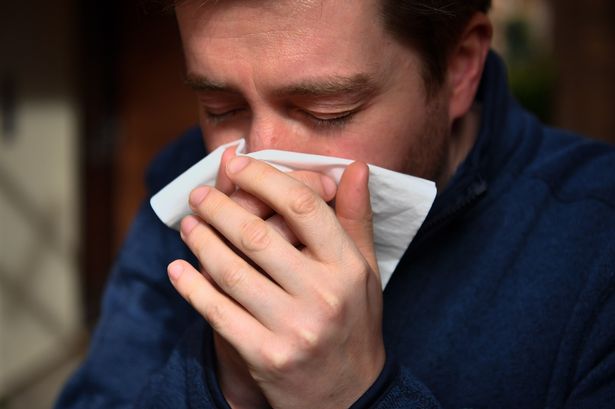Research has revealed drivers could be at risk of fines up to £2,500 as a result of driving while sick.
A study by Scrap Car Comparison has shown UK motorists are leaving themselves at risk of fines due to driving while suffering with symptoms such as sneezing, coughs and headaches. While seemingly harmless, almost 8m motorists could be running the risk of a penalty, if they are found to have caused an accident as a result of sneezing.
Categorised under a ‘driving without due care and attention’ charge, fines can total £2,500 and result in three to nine penalty points, which if you are a new driver (within the first two years of holding a license) would result in you having to retake your driving test.
READ MORE: Morrisons makes announcement to anyone who shops in its supermarkets
In addition to sneezing, other ailments people regularly admit to driving with, such as tiredness and runny noses could also be extremely dangerous for driving, especially if it results in attempted one-handed driving to wipe a runny nose or a lapse in concentration.
The study also looked at medications people have in their system when behind the wheel, and discovered that 1 in 10 drivers reported taking medications such as antihistamines while driving. This could cause side effects such as drowsiness, again leaving motorists at significantly higher risks of causing an accident.
Dan Gick, managing director at Scrap Car Comparison said: "Driving while feeling ill can put you at increased risk of having an accident and landing yourself in trouble with the law, so the best advice is to stay at home if you feel any of these symptoms, or if you are taking any medication that could impact your driving ability.
"However, we know that it’s not always that easy, especially if symptoms start whilst you’re already driving. If you start feeling unwell while driving, try to pull over at the earliest possible point when safe to do so.
"This can be a service station if you’re on a motorway, safely on the side of the road, or somewhere such as a car park. Once you’ve parked safely, take some time away from driving, get some fresh air and give yourself time to relax and reassess how you’re feeling."
He added: "It’s also always important to read the guidance labels on your medications or consult with a GP to find out more about what you’re taking and the activities you should avoid doing whilst taking them. If you know you need to drive whilst taking medications that could put you at risk of driving dangerously, consider asking a friend or family member to drive you, or take public transport if your journey is essential."
Top 10 symptoms people admit to driving while suffering from
- Cough – 34%
- Sore throat – 32%
- Runny/blocked nose – 30%
- Headache – 29%
- Sneezes – 19%
- Muscle or body aches – 17%
- Tiredness/fatigue/exhaustion – 14%
- Stomach cramps – 8%
- High temperature – 7%
- Fever – 6%
Top 10 medications people take while driving
- Paracetamol – 41%
- Ibuprofen – 27%
- Cold & flu medications/decongestants (eg. Lemsip, Sudafed) – 19%
- Antidepressants – 12%
- Antihistamines (eg. Piriton, Piriteze) – 9%
- Morphine, opiate or opioid-based drugs (eg. codeine, tramadol, fentanyl) – 3%
- Benzodiazepines (eg. Clonazepam, diazepam, lorazepam, flunitrazepam, oxazepam) – 2%
- Amphetamine (eg. dexamphetamine or selegiline – often used to treat ADHD) – 2%
- Nabiximols (used to treat multiple sclerosis) -2%
- Natural relaxants (eg. Valerian root, melatonin) – 1%
Receive newsletters with the latest news, sport and what's on updates from the Liverpool ECHO by signing up here
READ NEXT:
Coleen Rooney fans taken aback as they spot son's Prime birthday haul
Mrs Hinch 'unrecognisable' as she issues 'honest' family update
Millions of Asda customers given five day warning
This Morning fans thrilled as Carol Vorderman 'kicks off'
Urgent warning issued to parents of children drinking Prime energy drink

